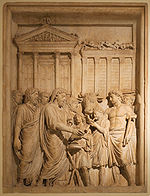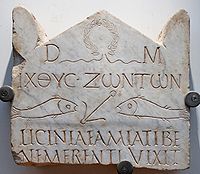- Manes
-
 Marcus Aurelius (head covered)
Marcus Aurelius (head covered)
sacrificing at the Temple of JupiterPractices and beliefsImperial cult · festivals · ludi
mystery religions · funerals
temples · auspice · sacrifice
votum · libation · lectisterniumPriesthoodsCollege of Pontiffs · Augur
Vestal Virgins · Flamen · Fetial
Epulones · Arval Brethren
Quindecimviri sacris faciundisJupiter · Juno · Neptune · Minerva
Mars · Venus · Apollo · Diana
Vulcan · Vesta · Mercury · CeresOther deitiesJanus · Quirinus · Saturn ·
Hercules · Faunus · Priapus
Liber · Bona Dea · Ops
Chthonic deities: Proserpina ·
Dis Pater · Orcus · Di Manes
Domestic and local deities:
Lares · Di Penates · Genius
Hellenistic deities: Sol Invictus · Magna Mater · Isis · Mithras
Deified emperors:
Divus Julius · Divus Augustus
See also List of Roman deitiesRelated topicsRoman mythology
Glossary of ancient Roman religion
Religion in ancient Greece
Etruscan religion
Gallo-Roman religion
Decline of Hellenistic polytheism
In ancient Roman religion, the Manes or Di Manes are chthonic deities sometimes thought to represent the souls of deceased loved ones. They were associated with the Lares, Genii, and Di Penates as deities (di) that pertained to domestic, local, and personal cult. They were honored during the Parentalia and Feralia in February.
Latin spells of antiquity were often addressed to The Manes, who were the spirits of deceased ancestors.[1]
Etymology and inscriptions
Manes may be derived from "an archaic adjective manus—good—which was the opposite of immanis".[2]
Roman tombstones often included the letters D.M., which stood for dis manibus, "for the Manes", an abbreviation that continued to appear even in Christian inscriptions.
The Manes were offered blood sacrifices. The gladiatorial games, originally held at funerals, may have been instituted in the honor of the Manes.[2] According to Cicero, the Manes could be called forth from the caves near Lake Avernus.[2]
Lapis manalis
When a new town was founded, a round hole would be dug and a stone called a lapis manalis would be placed in the foundations, representing a gate to the underworld.[2]
Due to similar names, the lapis manalis is often confused with the lapis manilis in commentaries even in antiquity:
The "flowing stone" … must not be confused with the stone of the same name which, according to Festus, was the gateway to the underworld.[3]
Bailey (1907) states:
There is, for instance, what anthropology describes as 'sympathetic magic'—the attempt to influence the powers of nature by an imitation of the process which it is desired that they should perform. Of this we have a characteristic example in the ceremony of the aquaelicium, designed to produce rain after a long drought. In classical times the ceremony consisted in a procession headed by the pontifices, which bore the sacred rain-stone from its resting-place by the Porta Capena to the Capitol, where offerings were made to the sky-deity, Iuppiter, but from the analogy of other primitive cults and the sacred title of the stone (lapis manalis), it is practically certain that the original ritual was the purely imitative process of pouring water over the stone.[4]
References
- ^ John G. Gager (15 November 1999). Curse tablets and binding spells from the ancient world. Oxford University Press US. pp. 12–. ISBN 9780195134827. http://books.google.com/books?id=rmhw2eVJnS0C&pg=PA12. Retrieved 22 August 2010.
- ^ a b c d Aldington, Richard; Ames, Delano (1968) New Larousse Encyclopedia of Mythology. Yugoslavia: The Hamlyn Publishing Group Limited, 213.
- ^ Burriss, Chapter 4 (accessed: August 21, 2007)
- ^ Bailey, chapter two (accessed: August 21, 2007)
- Bailey, Cyril (1907). The Religion of Ancient Rome. London, UK: Archibald Constable & Co. Ltd. Source: gutenberg.org (Accessed: August 21, 2007)
- Burriss, Eli Edward (1931). Taboo, Magic, Spirits: A Study of Primitive Elements in Roman Religion. New York, USA: Macmillan Company. Source: sacred-texts.com (Accessed: August 21, 2007)
Categories:- Undead
- Roman underworld
Wikimedia Foundation. 2010.

